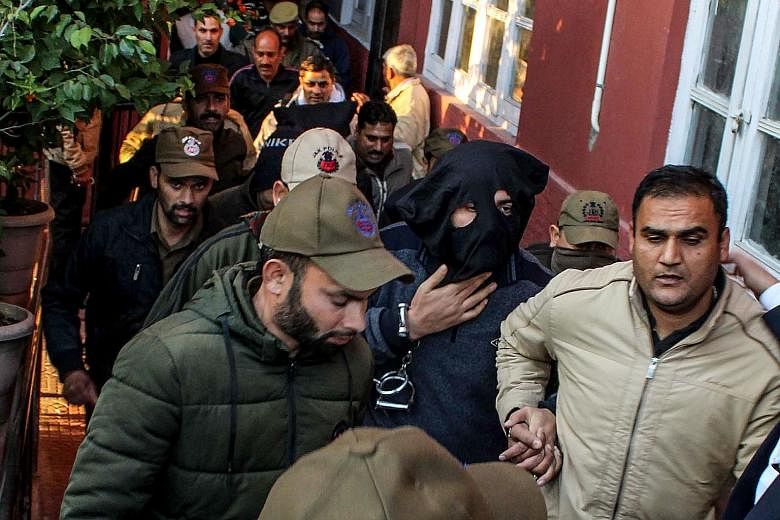When police officials flagged down a car at a checkpoint on the highway between Srinagar and Jammu on Jan 11, they did not anticipate the dramatic turn of events that were to unfold.
In it were two top wanted militants, along with a senior police officer from the Jammu and Kashmir police, who was ferrying them out of the state.
The arrest of Davinder Singh, 57, a deputy superintendent of police, along with the two terrorists, and a lawyer who was travelling with them, has shocked even those familiar with the cloak-and-dagger world of counter-terrorism in Jammu and Kashmir.
The region was changed into a federally administered territory in August last year.
On Jan 9, two days before his arrest, Singh was photographed at the Srinagar airport welcoming heads of diplomatic missions who were arriving for a visit organised by the Indian government.
He was part of a security team deployed at the airport. But by Jan 13, he had been suspended and faced charges of being a terrorist himself.
Police had also recovered arms and ammunition in the car, and at Singh's home.
There have been previous incidents of police and army personnel from the lower ranks deserting the forces to join terrorist groups in Jammu and Kashmir.
But this case has been described as a first of its kind, one in which a senior police officer has been caught in cahoots with terrorists. Singh had joined the police force in 1990. The former decorated cop has had his medal for gallantry "forfeited" by the Jammu and Kashmir administration, and investigations into the case have been handed over to the National Investigation Agency based in Delhi.
Mr Dilbag Singh, the director-general of police (DGP) for Jammu and Kashmir, told reporters last Monday: "A person who acts against the law is an enemy of the law and whosoever is an enemy of the law, we will take the strictest action against him."
But Singh's arrest has not come entirely out of the blue. There have been previous complaints against him, including some accusing him of extortion and torture. And his name was also mentioned in connection with a December 2001 attack on the Indian Parliament that killed 14, including five terrorists.
Afzal Guru, who was convicted and later executed for his role in the attack, had named him in a 2004 letter to his lawyer. He had accused Singh of torturing him and also ordering him to ferry a terrorist to Delhi and arranging accommodation for the man, who was later killed in the Parliament attack.
That he continued to serve and rise despite these red flags has prompted many questions. Was he really a rogue element? Or was he a deep state asset who had protection to carry on doing what he did?
Why was he ferrying top terrorists out of Kashmir? Was it to stage an attack in India's capital ahead of Republic Day yesterday? Or was it part of a clandestine intelligence operation that the Jammu and Kashmir police remained unaware of?
Mr Kuldeep Khoda, a former director-general of police for Jammu and Kashmir, said the police had conducted inquiries but found nothing of significance to warrant action against Singh when it came to the earlier complaints of extortion and torture.
"Yet, when I served as the DGP from 2007 to 2012, I did not put him on any sensitive duty, as a precaution," he told The Straits Times.
Mr Khoda added that given the arrest of Singh and the top terrorists, the accusation levelled against him by Guru needs to be reinvestigated.
The authorities in Delhi investigating the case then had chosen not to probe the allegations.
"No credence was given to the allegation back then as it had come from a convicted terrorist waiting to be hanged. But I think, in retrospect, the allegation about his role in helping the terrorist involved in the Parliament attack needs to be now looked into very, very deeply," Mr Khoda said, adding that the evidence unearthed so far suggests Singh was "acting on his own".
Shadowy methods have long been adopted by India's intelligence agencies, and officers are feted as long as these acts produce desired results.
So, when an unexpected arrest like this comes up, "the immediate impulse is to believe that there is something bigger and that the guy is not a lone ranger", said Mr Vipul Mudgal, the director of Common Cause, a leading advocacy group.
"It couldn't be just for money, no," he told The Straits Times. "A senior police officer who has seen a meteoric rise would not do something as stupid as ferrying top terrorists with prize money on their heads. His actions require a thorough investigation."
The opposition Congress party has alleged that the government is seeking to suppress key facts in the investigation into Singh's actions.
Mr Prakash Singh, a former director-general of police in Uttar Pradesh and the chairman of the India Police Foundation, an independent think-tank in Delhi, also said intelligence operations can be tricky and "often require cops to work in proximity with those inimical to the country's interests".
"But if his actions are found to be unlawful and not mandated, he should be held accountable and punished," he said.

